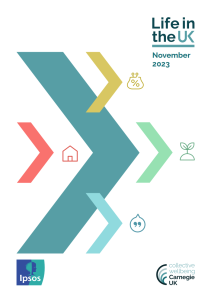- Democracy
- Economy
- Environment
- Evidence and reports
- Inequality
- Measuring wellbeing
- Society
- Jennifer Wallace and Jenny Peachey, Carnegie UK
- 30 January 2024
- ISBN: 978-1-912908-90-5
The Life in the UK index is the largest measure of the collective wellbeing of the people of the UK, looking at social, economic, environmental, and democratic aspects of life. Our research was conducted in partnership with Ipsos and the report is based on a survey of more than 6,900 people.
Summary
- The 2023 research found that older people living in the UK have higher levels of wellbeing than younger people.
- The findings indicate a widespread lack of trust in UK political systems and institutions. Political parties and governments across the UK must invest in fresh and sustained efforts to reduce alienation from local and national decision-making and increase opportunities for meaningful participation.
- The Life in the UK index shows that it is possible to create a robust and comprehensive measure of social progress, rather than rely on GDP data alone.
- Disabled people have a lower collective wellbeing score compared to non-disabled people.
- People living in the most deprived areas have a lower collective wellbeing score compared to those living in the least deprived areas.
- People on the lowest household incomes have a lower collective wellbeing score compared to those on the highest.
- Social housing tenants and private tenants have a lower collective wellbeing score than homeowners.
- People living in urban areas have a lower collective wellbeing score compared to rural areas.
- People from Black, Asian and minority White ethnic groups and people with mixed ethnic backgrounds have lower collective wellbeing scores compared to people from a White British background.
This summary sets out the key findings relating to social, economic, environmental, and democratic wellbeing. A higher score means that we found higher levels of wellbeing for those people and places.
Social wellbeing includes aspects from health and mental health to neighbourhood safety and relying on each other. The UK scores 72 out of a possible 100 for social wellbeing. The people most likely to experience high levels of social wellbeing are non-disabled, live in areas of affluence and are over 55 years of age. Being a homeowner, having a higher annual household income and identifying as belonging to White British ethnic group also lead to a higher collective wellbeing score. Living in a rural area and being male are also predictors of higher levels of social wellbeing, albeit less so than the demographic variables already listed. Disability has the largest negative impact on social wellbeing of all the socio-demographic characteristics we explored.
Economic wellbeing includes access to a decent income, affordability, financial resilience, job opportunities and skills. Overall, the UK scores 71 out of a possible 100 for economic wellbeing. As with social wellbeing, there are particular groups of people who are more likely to have high or low economic wellbeing scores. Analysis reveals that those most likely to experience high levels of economic wellbeing are those with higher household incomes, homeowners and those without children in the household. (The more children in the household, the worse the economic wellbeing score). The next most relevant predictors of a higher wellbeing score are being non-disabled, living in areas of affluence and being over 55 years old.
Environmental wellbeing includes access to green and blue spaces, quality of the local environment and collectively living within the planet’s natural resources. The UK scores 63 out of a possible 100 for environmental wellbeing. England scores lower on environmental wellbeing than Scotland, Wales and Northern Ireland (63 compared to 65, 66 and 67 respectively). Analysis shows that the demographic groups most likely to experience high levels of environmental wellbeing are those who live in more affluent areas, those living in rural areas and those aged over 55. Other relevant predictors are being non-disabled, being a homeowner and identifying as belonging to the White British ethnic group.
Democratic wellbeing includes participation, trust in key institutions and ability to influence decisions at a national and local level. The UK scores 41 out of a possible 100 for democratic wellbeing, Northern Ireland reports lower democratic wellbeing scores than England, Scotland and Wales (36 compared to 39, 39 and 41). The democratic wellbeing score is the lowest of all wellbeing domains. Low scores for democratic wellbeing were common across the population. Analysis shows that demographic variables explain less of the variation between people’s democratic wellbeing score compared with other wellbeing domains. This reflects that there are wider issues influencing respondents’ democratic wellbeing (for example, trust and influence) that go beyond core demographic characteristics.
Help us make the case for wellbeing policy
Keep in touch with Carnegie UK’s research and activities. Learn more about ways to get involved with our work.
"*" indicates required fields
